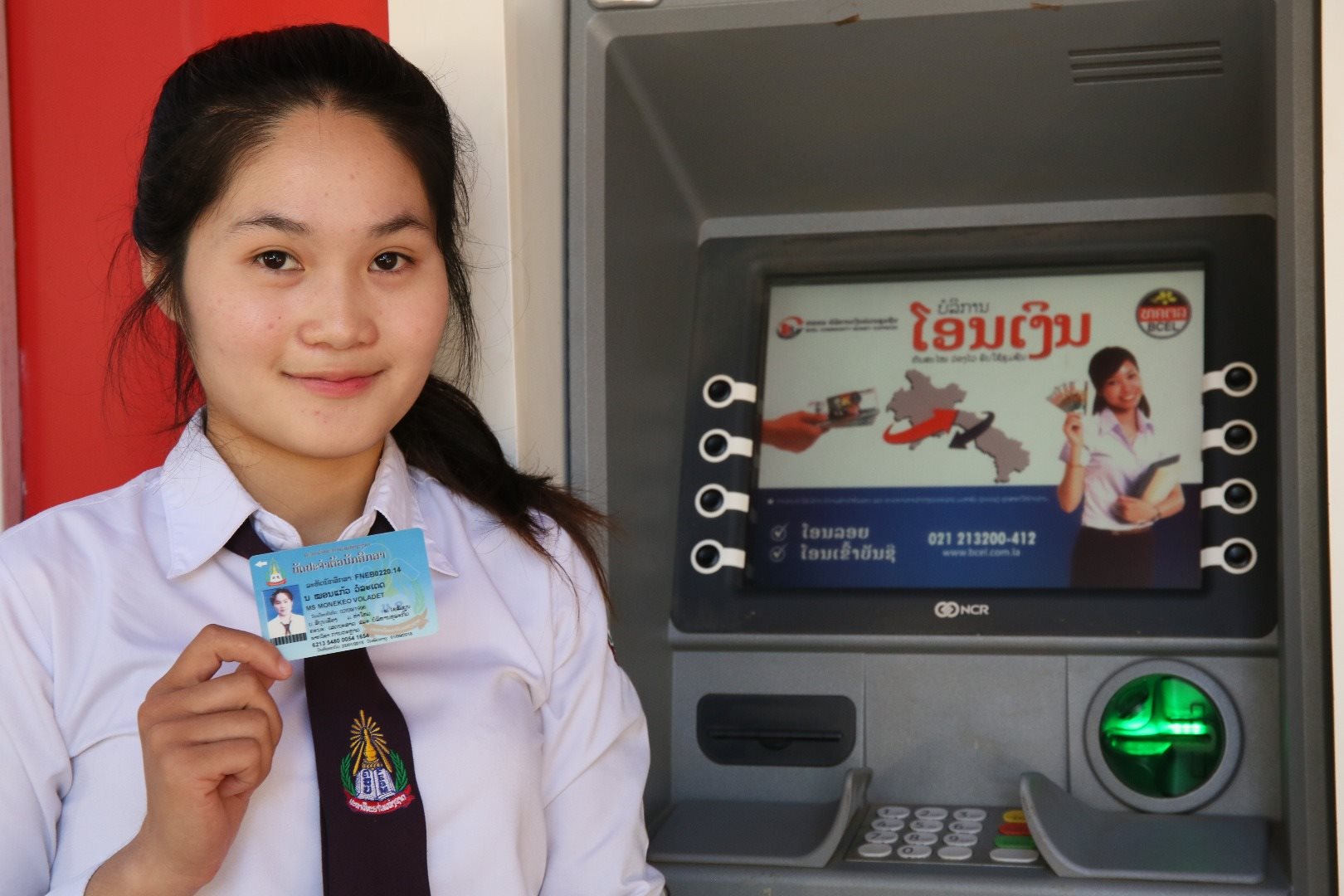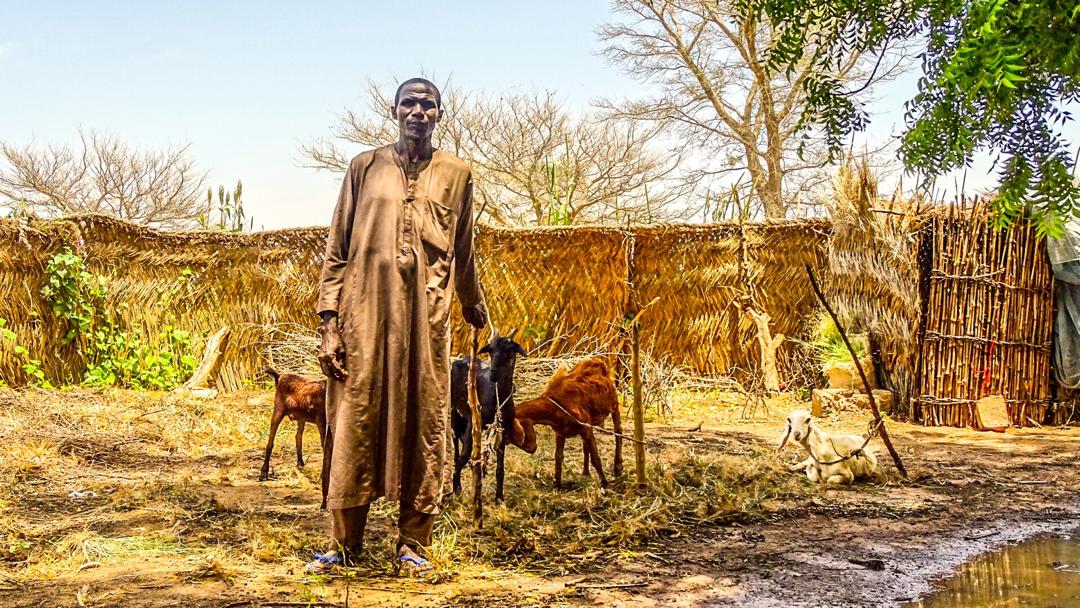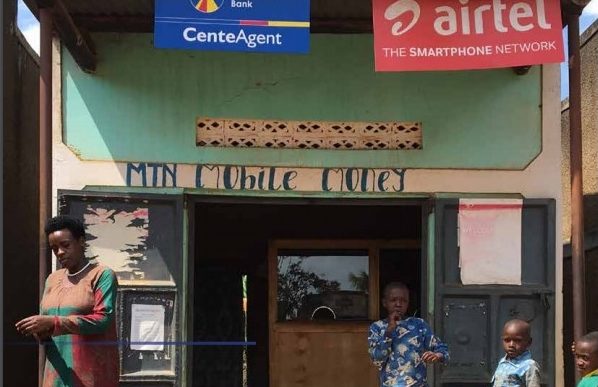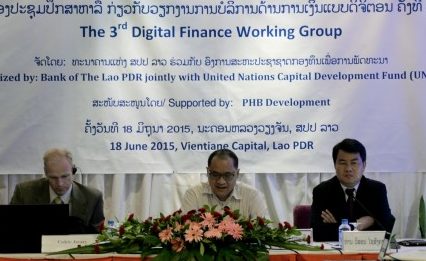
Community development through digital finance in Lao PDR
Republished from the UNCDF MM4P website: This article was first published on 21 June 2017 at https://www.uncdf.org/article/2512/community-development-through-digital-finance-lao
Using branchless banking to support education, agribusiness and more
There is an old Lao saying, ‘If you don’t go out of the village, you will not see the land far away; if you don’t go study, you will not have any knowledge.’ It is still commonly used in the Lao People’s Democratic Republic (Lao PDR)—a country with a surge in demand for education, with 78% of youth enrolled in lower secondary education[1] while 56% of adults have primary education or less[2] (see the figure for more detail). Sending children away from home for higher education is considered a requirement for parents to build their children’s future. So, there is little surprise that sending money to support children’s education has become a primary use case for the first branchless banking service in Lao PDR.
Banque pour le Commerce Extérieur Lao Public (BCEL), one of the country’s leading banks, developed the branchless banking service, which is called BCEL Community Money Express (BCOME). It is entirely new; no other bank offers this kind of service in Lao PDR. Supported by United Nations Capital Development Fund (UNCDF) and its national implementation programme Making Access to Finance More Inclusive for Poor People (MAFIPP) and PHB Development, BCEL launched BCOME
in June 2015 with a small pilot of only 11 agents. Today, with more than 125 agents in every province of the country, BCOME has more than doubled the size of the BCEL branch and service unit network. Villagers perceive BCOME as convenient, quick, safe and friendly, the latter because it is offered by someone they know in their community—a neighbour, relative or acquaintance in town whom they can trust and with whom they can comfortably share their needs.
Figure from
FinMark Trust and UNCDF-Making Access Possible, FinScope Survey Highlights: Laos 2014, p.9 (n.p., November
2015).
© UNCDF MM4P
Agriculture is the backbone of the Lao economy, but farmers are dispersed, living in remote, rural areas throughout the country. Travelling to a district town can be an undue burden for them, and accessing formal financial and banking services is even more difficult both because of the distance to a bank branch and because of insufficient income and low financial literacy. These challenges have understandably led farmers to depend on cash. For them, sending money to family members in other provinces by a bus driver is a method often used, but it is time consuming and sometimes risky.
Sompong Veosy, a farmer from Souvannaphoum Village in Paklai District, grows rice and raises buffalo and cows for his income. He normally spends all day looking after the rice paddy and livestock, only leaving his farm after sunset. Taking time from his work to travel to town to complete a transaction is exhausting. But, since a BCOME agency in his village opened, his outlook has changed. “In the past, I had to travel a long way to send money to my children for their education, but now it is easy, fast and convenient. I am very, very happy now. It is perfect,“ he explained with a happy smile.
Sompong Veosy, a farmer from Souvannaphoum Village in Paklai District.
© UNCDF MM4P
The BCOME service has drawn this new customer segment to BCEL, which has been surprised to learn just how much money from rural farming communities flows throughout the country. Through the service, BCEL can stay close to these new customers and learn about their requirements.
Thong Khoun, a villager from Thakokhai in Pakngum District, regularly sends money through BCOME to her son who is studying in the southern part of the country. Sometimes, though, it is the opposite: she has an urgent expense of her own, and her son sends money back to her. “My son asked me to open a bank account so that he can send money to me in the future. So, I wish that BCOME can open the account here. It is convenient because it is close to our house,” Ms. Khoun explained. “I used to ask the agent if I can open my account with her. I want to save money, and I also want to have an ATM card. I feel that I don’t want to carry cash anymore. If I have a card, wherever I go I can withdraw money from the machine—that is what I want now. If we can open the account with BCOME, it would be wonderful,” she added.
BCOME is not only a solution for farmers to support their children’s education, it also allows them to have more opportunities to trade their products more broadly—helping them to break free of poverty. It helps farmers increase their income by providing a quick and easy payment system. BCOME responds directly to the needs of communities with a service that old-fashioned banking cannot provide. Siavone Phomavong, an agent in the capital city of Vientiane, shared an example: “I have a customer who sells organic vegetables. He sends money to buy them from farmers in Pakse, Champasak Province.” The BCOME service assists the growth of agribusinesses, as the money from buyers in the main cities flows out to farmers in the provinces, where the farmers can save and re-invest for better techniques and more productivity.
The access afforded by branchless banking does not only support education of farmers’ children and their agribusiness, it is also suited to many different types of business requirements, such as paying for insurance and making monthly payments for the purchase a car. Early adopters who have experienced the efficiency of the first branchless banking service in Lao PDR have greater understanding of the new system and value the system more. It benefits them in many ways, relieving stress in their lives and reducing the time and the cost of transactions, which in turn gives them a chance to save and thereby prepares them to take a first step out of the poverty trap.
In the future, BCOME will continue to grow with new product and service offerings and to play an important role in accelerating the growth of all kinds of businesses. The convenience and accessibility can be applied to any customer segment, from low-income populations who deal in small transaction amounts to large organizations that can network with people in any isolated region. These advancements will contribute to a greater number of people improving their livelihood by using a low-cost, easy and friendly system, which will drive the economy of the household and in turn the communities that form the core of the country’s wealth.
This is the second blog post of a series about the dawn of digital financial services in Lao PDR. Read also “Agents—The revolution on the ground in Lao PDR” for an agent’s perspective.
June 2017. Copyright © UN Capital Development Fund. All rights reserved.
The views expressed in this publication are those of the author(s) and do not necessarily represent those of the United Nations, including UNCDF, or their Member States.
[1] Lao People’s Democratic Republic, Ministry of Education and Sports, Education and Sports Sector Development Plan (2016–2020) (Vientiane, December 2015).
[2] FinMark Trust and UNCDF-Making Access Possible, FinScope Survey Highlights: Laos 2014 (n.p., November 2015).
For more information, please contact:
Aliska Bajracharya
KM Consultant, Lao PDR
http://mm4p.uncdf.org
David Kleiman
DFS Expert in Lao PDR
Stay Connected
Launch


